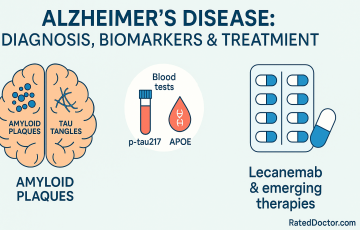
Consultant Neurologist | Specialist in Stroke & Dementia
Based at The Walton Centre NHS Foundation Trust, Liverpool
Profile Summary
Dr Alakendu Sekhar is a highly experienced Consultant Neurologist and recognised authority in vascular neurology, acute stroke interventions and epilepsy management. With dual accreditation in neurology and stroke medicine, he leads clinical and research services that span the Cheshire & Merseyside region, delivering complex care in a major tertiary neuroscience centre.
Expertise & Specialist Services
Stroke & vascular neurology – Dr Sekhar established the stroke-thrombectomy service at The Walton Centre, which accepts referrals from all local stroke units in the region, demonstrating leadership in hyper-acute stroke care. thewaltoncentre.nhs.uk+1
Thrombectomy & thrombolysis – He chairs the regional stroke thrombectomy multidisciplinary team (MDT) and serves as Deputy Lead for the Hyper-acute Stroke Research Centre (HSRC) for Cheshire & Merseyside. thewaltoncentre.nhs.uk
General neurology & epilepsy – In addition to his vascular work, Dr Sekhar maintains a general neurology clinic and leads an epilepsy service, including the management of post-stroke epilepsy. thewaltoncentre.nhs.uk
Complex neurovascular cases – He runs a dedicated cerebrovascular specialist clinic for complex neurovascular disorders, providing tertiary input in neurology beyond routine stroke care. thewaltoncentre.nhs.uk
Medicolegal & private practice – Outside the NHS, Dr Sekhar is engaged in medicolegal expert work in neurovascular injury and brain-injury litigation, and offers private consultations at regional hospitals. expertwitness.international+1
Professional Experience & Credentials
Completed specialist training in neurology and stroke in the south-west of England in 2012, with dual CCT accreditation in Neurology and Stroke Medicine. thewaltoncentre.nhs.uk+1
Awarded FRCP (Edinburgh) and holds MRCP (UK) and MRCP (Neurology) qualifications. thewaltoncentre.nhs.uk+1
Clinical Excellence Award recipient in his first year as a consultant, for developing the stroke intervention pathway for the Cheshire & Merseyside stroke network. meditsimple.com
Honorary Senior Lecturer, School of Medicine, University of Liverpool; Regional Advisor (Mersey) for the Royal College of Physicians Edinburgh; Member of the Stroke Advisory Committee for the Association of British Neurologists (ABN). thewaltoncentre.nhs.uk+1
Research Profile
Dr Sekhar has made substantial contributions to the scientific literature in cerebrovascular medicine and acute stroke intervention, with a ResearchGate profile listing over 25 publications in major stroke and neurology journals. ResearchGate+1 He is actively involved in large-scale trials such as ACST-2, ECST-2, PISTE and VIST, and leads regional research efforts to promote hyper-acute stroke therapies. thewaltoncentre.nhs.uk
His leadership of the regional thrombectomy MDT and role with the HSRC reinforce his position as a trusted expert driving service innovation and evidence-based practice.
Experience
Patients under Dr Sekhar’s care benefit from a consultant who combines tertiary-level expertise with regional service leadership. His service at The Walton Centre covers not only the hospital’s neuroscience catchment but all associated stroke units across Cheshire & Merseyside. thewaltoncentre.nhs.uk His dual role in clinical care and research ensures that patient management is informed by the latest evidence and delivered in a centre rated “Outstanding” for neuroscience care. thewaltoncentre.nhs.uk
Why Choose Dr Alakendu Sekhar?
Proven leader in stroke intervention and vascular neurology, with a major regional thrombectomy service under his guidance.
Extensive experience in complex neurology and epilepsy beyond standard outpatient clinics.
A research-active clinician ensuring up-to-date, evidence-based care.
Trusted by patients, colleagues and professional bodies alike through teaching, leadership and expert witness work.
Practising at a nationally recognised neuroscience centre, offering both NHS and private access.
MBBS, MRCP (UK), MRCP (Neurology), FRCP (Ed), CCT in Neurology & Stroke Medicine
Vascular Neurology, Stroke Medicine, Dementia
English, Bengali, Hindi, Assamese
New patients £275
Follow ups £165

Alzheimer’s disease is a progressive brain disorder that causes memory loss, confusion, and difficulty with thinking or language. It is the most common cause of dementia and worsens gradually over time.
Normal ageing may cause occasional forgetfulness (like misplacing keys), but Alzheimer’s leads to persistent memory loss, personality changes, and difficulty performing everyday tasks, which interfere with daily life.
The exact cause isn’t fully understood, but it involves the buildup of amyloid plaques and tau tangles in the brain, which damage and kill nerve cells.
Genetic factors, especially the APOE ε4 gene, and conditions like diabetes, hypertension, and heart disease can increase risk.
Common early symptoms include:
Forgetting recent conversations or events
Difficulty finding the right words
Getting lost in familiar places
Misplacing items or repeating questions
Changes in mood or personality
If you or a loved one notices these signs, seek medical advice early.
Diagnosis includes:
Cognitive tests to assess memory and thinking
Brain scans (MRI, PET) to look for shrinkage or plaques
Blood tests to rule out other conditions and, increasingly, to detect biomarkers like p-tau217 and Apolipoprotein E (APOE).
These newer blood tests are making earlier, simpler diagnosis possible.
The p-tau217 test measures levels of a tau protein linked to Alzheimer’s disease. It is a non-invasive and accurate biomarker that helps doctors detect the disease even before symptoms become severe.
APOE is a gene involved in how the body processes fats.
People with the APOE ε4 variant have a higher risk of developing Alzheimer’s disease earlier in life.
Testing for APOE helps assess genetic risk and guides treatment suitability for newer drugs like Lecanemab.
Current treatment options include:
Cholinesterase inhibitors (Donepezil, Rivastigmine) and Memantine to support brain function.
Lecanemab (Leqembi®) – a new antibody therapy that targets amyloid plaques and may slow disease progression in early Alzheimer’s.
Lifestyle measures such as exercise, diet, sleep, and social engagement can also make a difference.
Lecanemab is approved in some countries and is undergoing regulatory review for NHS use. It is currently available in specialist memory clinics as part of research or early access programmes.
Your neurologist can advise if you might be eligible once it becomes widely available.
There’s no guaranteed prevention, but reducing risk factors helps:
Stay physically and mentally active
Eat a Mediterranean-style diet
Control blood pressure, cholesterol, and diabetes
Avoid smoking and excessive alcohol
Get regular sleep and social interaction
Alzheimer’s is one type of dementia. Others include vascular dementia, Lewy body dementia, and frontotemporal dementia.
Each has distinct causes, but symptoms often overlap, so proper diagnosis is essential.
You should see your GP or a specialist if you notice persistent memory problems, confusion, or changes in personality or behaviour.
Early diagnosis allows better planning, treatment, and access to new therapies.
